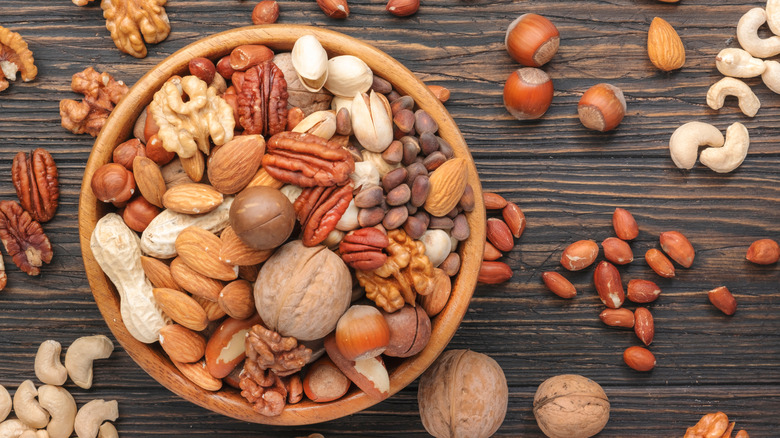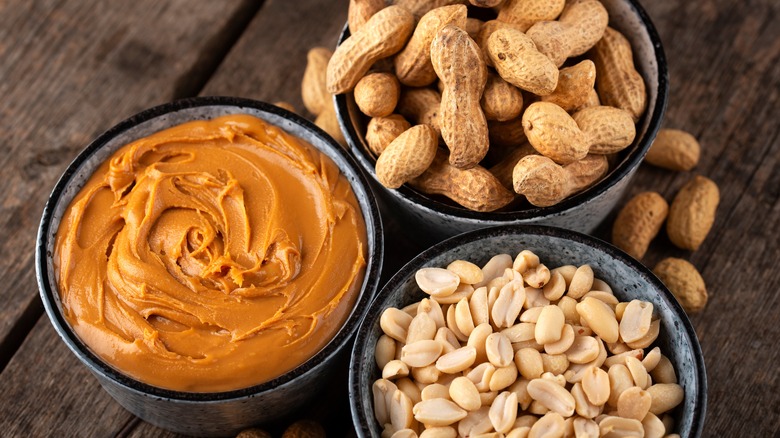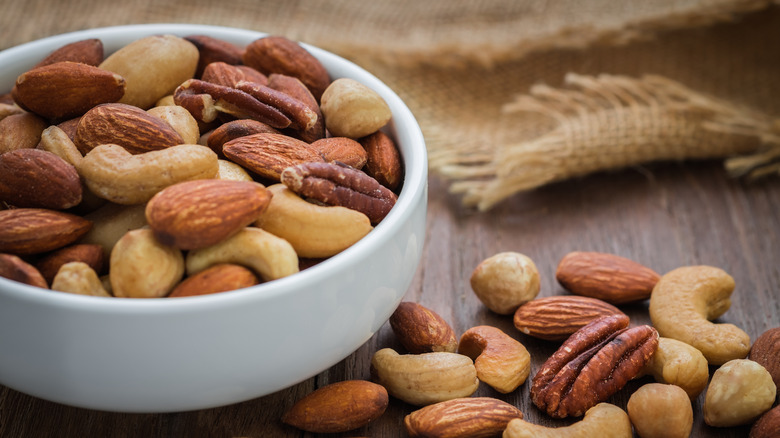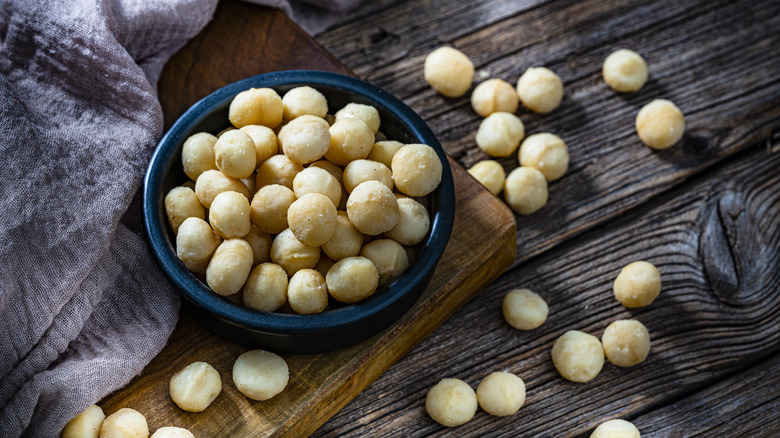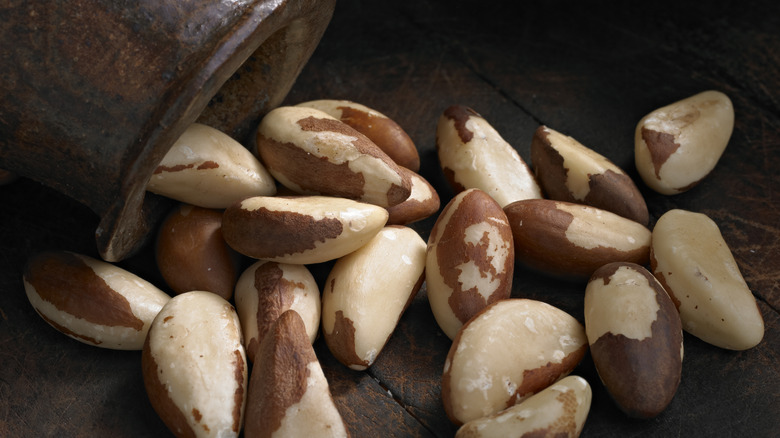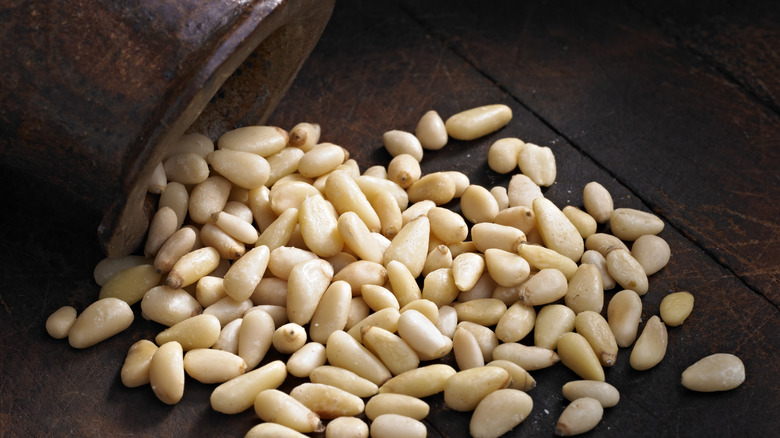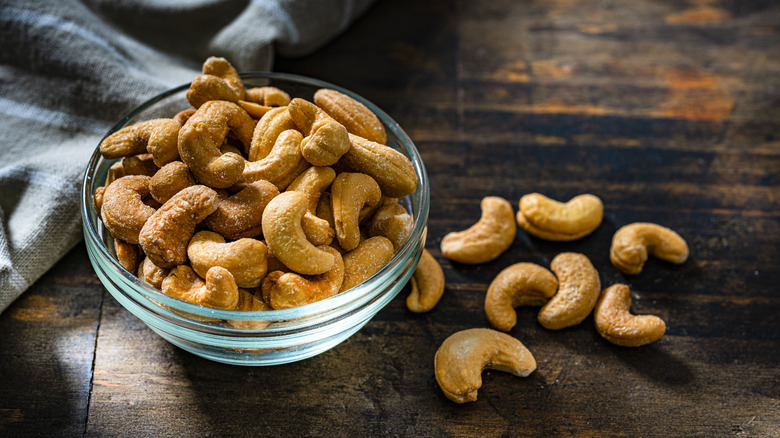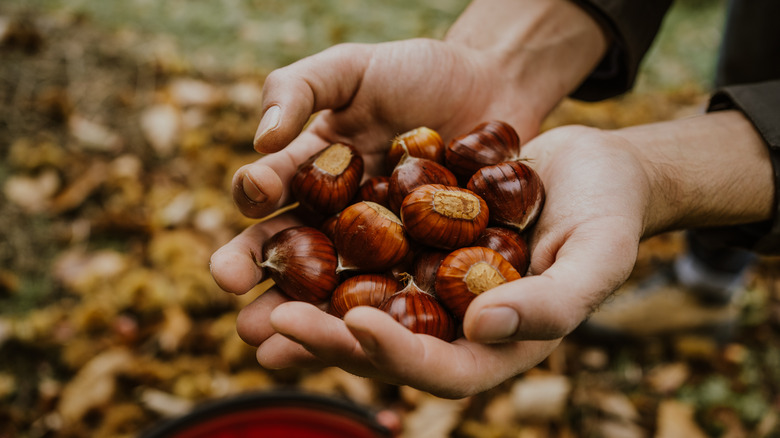8 Types Of Nuts You Might Want To Avoid Eating And Why
Nuts have long been celebrated for their delectable taste, nutritional benefits, and wide range of uses in delicious recipes. From sprinkling them on salads to using them as a key ingredient in desserts, nuts add a delightful crunch and a savory, buttery flavor to all kinds of meals. Packed with essential nutrients and healthy fats, nuts offer a host of health benefits, including promoting heart health, aiding in weight management, and providing a valuable source of energy.
However, among the whole host of delicious nuts out there, a few specific kinds do warrant caution for some individuals. Allergies to nuts, one of the most common food allergies, can lead to severe reactions and even life-threatening situations. Apart from allergies, certain nuts contain toxins or compounds that are harmful when ingested, making them unsuitable for consumption. Moreover, individuals with specific health conditions, such as heart disease or cholesterol concerns, may need to be mindful of the fat content in some nuts.
While the vast majority of people can safely enjoy a wide assortment of nuts without any worry, it's crucial to remember that not all nuts are created equal. In this comprehensive article, you'll learn a little more about the eight kinds of nuts you should probably stay away from and the reasons behind each nut's potential risks. By knowing which nuts to watch out for, you can make an informed decision about your nut consumption and have a balanced approach to nuts in your diet.
Peanuts
While peanuts are technically legumes, they are still commonly grouped with nuts and are known to cause severe allergic reactions in some people. In fact, peanuts allergies are some of the most common allergies in the world. According to the Mayo Clinic, symptoms can be mild, like some bothersome skin irritation, or life-threatening, like anaphylaxis. Individuals with peanut allergies should avoid peanut-containing products such as peanut butter and certain baked goods.
Individuals on certain diets, such as those following a low-carb or ketogenic diet, may choose to eat peanuts in moderation. While peanuts are a good source of protein and healthy fats, they're not particularly low in carbohydrates, so if you're on a carb-restrictive diet like keto, then you may want to exclude peanuts from your meal plan — or at least limit your intake. If you're looking to maintain a state of ketosis or keep your carb intake low, try alternatives like almonds or macadamia nuts instead.
Tree nuts
Tree nuts are more of a category of nuts, but if you have allergies, it's important to know which nuts are part of this group. Tree nut allergies are some of the most prevalent kinds of allergies, and the American College of Allergy, Asthma, and Immunology reports that they can cause symptoms ranging from rashes and itching to anaphylaxis. Even a small amount of tree nut protein can cause a severe response in some people, so it's important for those with allergies to avoid these nuts. Common tree nuts include almonds, Brazil nuts, cashews, hazelnuts, macadamia nuts, pecans, pine nuts, and pistachios.
Aside from allergies, there are a few other reasons you may not want to consume too many tree nuts. For instance, if you have certain dietary needs or preferences, like a low-FODMAP diet, you may need to think twice. Certain tree nuts like cashews and pistachios can be high in fermentable carbohydrates, which may trigger digestive discomfort for those with sensitive guts, as noted by Verywell Health.
Also, some individuals may choose to avoid tree nuts because of their high calorie and fat content. While tree nuts are rich in nutrients and full of healthy fats, they are also energy-dense, and even a handful of tree nuts can have a high calorie count that may derail weight maintenance or loss goals.
Macadamia nuts
If you have concerns about your cholesterol levels or are at risk for heart conditions, it's important to consider the saturated fat content in macadamia nuts. Fifty grams of macadamia nuts contain about 7.6 grams of saturated fat — for comparison, a 2,000-calorie diet should only contain up to 22 grams of saturated fat per day. Medline Plus points out that high saturated fat intake is linked to an increased risk of heart disease and can elevate LDL cholesterol levels, often referred to as "bad" cholesterol.
The good news is that the vast majority of the fat in macadamia nuts is monounsaturated fat, which is considered heart-healthy. Monounsaturated fats have been shown to have a positive impact on reducing LDL cholesterol levels. Monounsaturated fats can also help improve overall heart health, lower blood pressure, and reduce inflammation. The heart-healthy monounsaturated fats found in macadamia nuts can also aid in weight management, as they contribute to a sense of fullness and satisfaction after meals, potentially reducing overall calorie intake. However, the nuts themselves are high in calories and should be eaten in small portions.
Macadamia nuts are also a good source of other nutrients like vitamin B1 (thiamin) and manganese. These nutrients play essential roles in energy production, nerve function, and bone health, making macadamia nuts a nutritious and tasty snack option.
Brazil nuts
Brazil nuts are delicious and heart-healthy, but they're not suitable for everyone because they're high in selenium. According to a 2021 study, selenium is a vital mineral that plays a crucial role in various bodily functions, including supporting the immune system, regulating thyroid hormones, and acting as an antioxidant.
However, the recommended daily intake of selenium for adults is relatively low at 55 micrograms per day, and Brazil nuts contain an exceptionally high concentration of this mineral. In fact, just one Brazil nut can provide more than the daily recommended intake of selenium. Therefore, overindulging in Brazil nuts can lead to selenium toxicity, also known as selenosis. As outlined by the National Institutes of Health, symptoms of excessive selenium consumption include dizziness, fatigue, hair and nail damage or loss, and motor weakness.
People who have selenium imbalances such as selenosis should avoid eating Brazil nuts. Also, a 2001 study suggested that if you live in a region with high levels of selenium in the soil or water, you should eat Brazil nuts with caution, since you may already be getting more than enough selenium on a day-to-day basis. Pregnant women and breastfeeding mothers should also be mindful of their Brazil nuts consumption. While selenium is essential during pregnancy, the University of Rochester Medical Center points out that excessive amounts can be harmful. Consult with a healthcare professional or a registered dietitian to determine the appropriate selenium intake if you are an expectant or breastfeeding mother.
Bitter almonds
The almonds that you find in grocery stores are a delicious snack that can provide you with protein and healthy fats while engaging in a healthy and balanced lifestyle. But you might not know about another kind of almond, one that you won't be able to purchase at any grocery store in the United States.
Bitter almonds look identical to regular almonds, so you wouldn't be able to tell the difference at first glance. But bitter almonds aren't available in grocery stores because of their risk of toxicity. Bitter almonds contain amygdalin, which is a compound that your body converts into cyanide when ingested. Cyanide is a highly toxic substance that can lead to severe poisoning symptoms and, in high enough doses, could even be fatal. If you ingest bitter almonds, you could find yourself experiencing symptoms of cyanide poisoning, which, as the CDC reports, might include weakness, nausea, vomiting, confusion, a rapid heart rate, difficulty breathing, and seizures. In the most severe cases, cyanide poisoning can result in cardiac arrest and death.
Cooking bitter almonds with methods like baking, boiling, and microwaving can significantly reduce the level of amygdalin in the almonds, but this practice is risky. According to Healthline, since there's no clear way to determine the exact reduction in cyanide levels while cooking the almonds, you may not remove enough to make it safe and the nuts could still be dangerous to your health. Sweet almonds, which do not contain significant amounts of amygdalin, are considered safe for consumption.
Pine nuts
Some people love pine nuts and enjoy them regularly as a tasty snack, but some individuals may want to avoid certain kinds altogether. While not overly common, some people experience a phenomenon called "pine mouth" which occurs when eating certain types of pine nuts. A 2012 abstract from the U.S. Department of Agriculture pinpointed nuts that come from the stone pine (pinus armandii) as the likely culprit.
But what is "pine mouth"? It's a strong and unpleasant metallic or bitter taste in the mouth that some people experience after eating pine nuts. People who experience this condition often describe it as "coppery" and compare it to sucking on old pennies. The awful taste typically develops within a day or two after consuming pine nuts and can persist for as long as four weeks. We're not entirely sure what causes pine mouth, but according to the BBC, the condition is almost always temporary, and it doesn't cause any permanent harm. However, while you're experiencing it you may be bothered or put off by other foods.
Not everyone will have this strange taste experience, but it's better to be safe than sorry. To avoid falling victim to pine mouth, try to buy your pine nuts from reputable brands that source their pine nuts from pine tree varieties that have not been linked to the condition.
Cashews
Cashews are much more than a favorite midday snack — they've become an indispensable staple for those with vegan or plant-based lifestyles due to their versatility. But if you're looking to become more aware of the ethical implications of your purchases, then you may want to think twice about adding cashews to your cart.
Unfortunately, the cashew harvesting industry has raised serious concerns about the unethical treatment of its workers and a slew of human rights injustices, especially in high-production regions like India, where a large portion of the world's cashews are harvested. One of the primary ethical concerns is the harsh working conditions and exploitation faced by cashew workers. In major cashew-producing regions, workers endure long hours of manual labor without adequate protection or fair compensation. Child labor is a particularly upsetting issue, with young children forced to work in hazardous conditions. The use of child labor not only deprives these children of education but also perpetuates the cycle of poverty within their communities.
There's also concern about the lack of fair compensation for cashew farmers. Middlemen and traders often exploit cashew farmers by offering unfairly low prices for their produce, and this economic exploitation limits growth and development opportunities. If you're still set on stocking up on cashews, try to source your nuts from companies that are committed to fair labor practices and sustainable supply chains.
Horse chestnuts
Horse chestnuts are often confused with regular chestnuts, which are completely safe to eat. However, horse chestnuts are not safe for human consumption and you'll never find them in a grocery store. WebMD reports that they contain a toxic compound known as esculin, which can have adverse effects on human health when ingested.
Esculin is a toxic compound that is found in the seeds and leaves of horse chestnuts. When consumed, it can lead to intense gastrointestinal issues like nausea, vomiting, diarrhea, and abdominal pain. According to Poison Control, the toxic effects can be more severe and may also include dizziness, weakness, and even neurological symptoms. If you or someone else accidentally ingests horse chestnuts and experiences any of these symptoms, seek immediate medical attention or call poison control.
Ingesting even a small amount of horse chestnuts is especially dangerous for children or pets, who may be more likely to mistake them for edible chestnuts. To ensure safety, make sure you know the difference between horse chestnuts and edible chestnuts. Edible chestnuts are closed up in a spiny shell, while horse chestnuts have a bumpy, fleshy shell.
